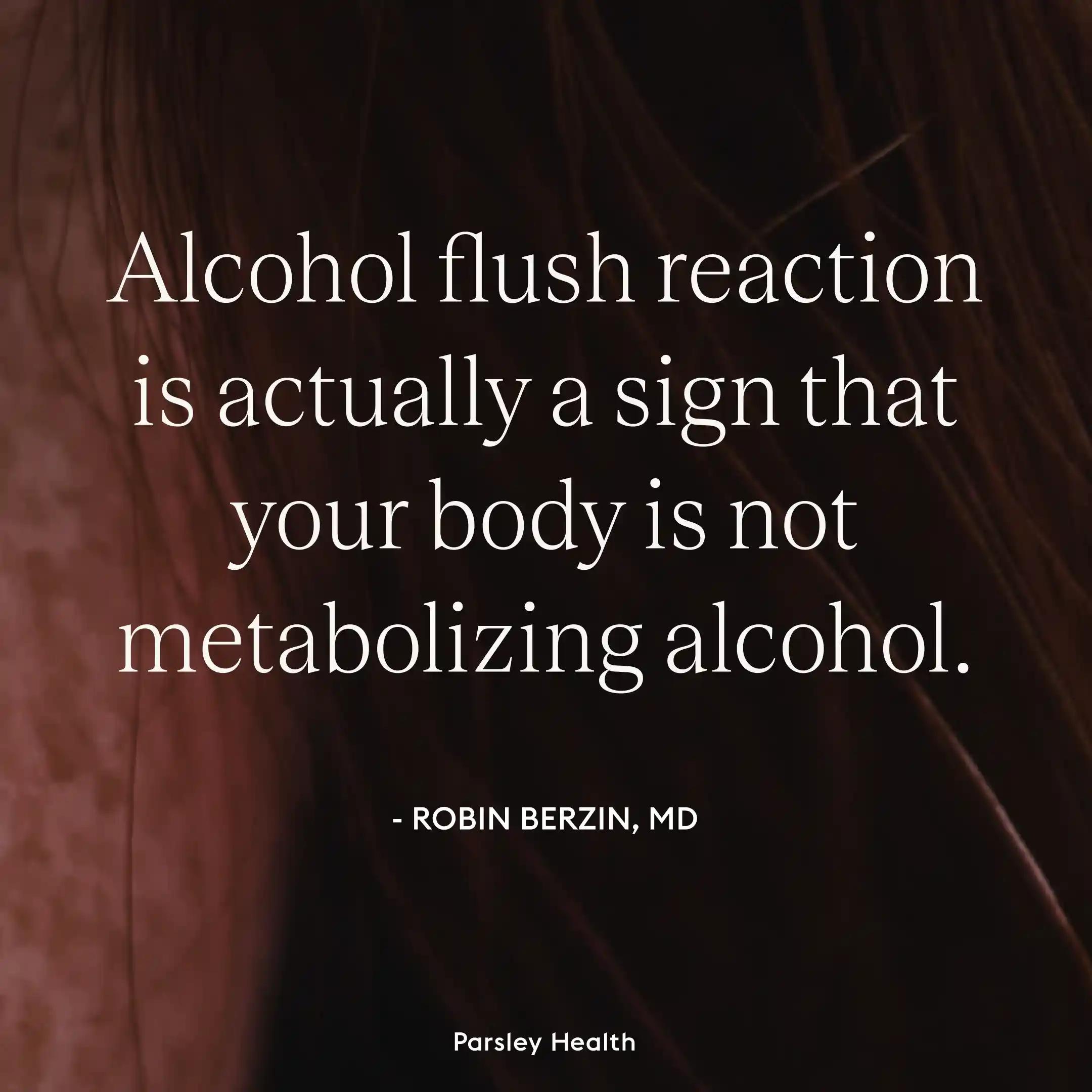This article contains additional reporting by Jennifer Chesak.
At Parsley Health, we often get asked, "Why does my face get red when I drink?"
Here’s the scenario. You decide to grab a happy hour drink with friends. But shortly after one cocktail or even a few sips, your face becomes hot, splotchy, and kind of itchy. You look over at your friend, but their face hasn’t changed. What’s going on?
Getting rosy cheeks when you drink alcohol is more common than you think. Here's why you might get an alcohol flush reaction, what’s going on in your body, and the concerns regarding this adverse reaction.
Why does alcohol flush happen?
Alcohol raises your blood pressure. This may be enough to cause facial flushing. However, some people also have genetic variant that affects the ALDH2 gene, leading to an alcohol intolerance.
If you have this mutation, you may have a deficiency in alcohol dehydrogenase. This is an enzyme that breaks alcohol down into acetaldehyde, which is a toxic molecule. Then another enzyme called aldehyde dehydrogenase metabolizes the acetaldehyde into nontoxic molecules.

A poor acetaldehyde metabolism can lead to the release of histamine. Your immune system releases histamine in response to an injury, allergy, or inflammation. Histamine can cause the capillaries in your face to dilate, leading to a facial flush.
About 8 percent of the global population has this genetic variant, leading to an alcohol intolerance. And about 36 percent of people of East Asian descent have it.
In some cases, a flushed face while drinking could be the result of an allergy to something in the beverage. Those who have asthma or allergies should be particularly mindful of the ingredients they may be sensitive to.
Here are some common culprits in beer, wine, and spirits.
- grapes
- yeast
- hops
- barley
- wheat
- corn
- rye
- food coloring or dyes
- preservatives (especially sulfites)
- additives
- seafood proteins
- egg
- histamine (this can be a byproduct of fermentation and brewing)
You may also experience flushing if you take medications that affect alcohol metabolism. A good rule of thumb is to check instructions regarding any medications to see if they recommend avoiding alcohol consumption. You can also talk to your doctor or pharmacist about any concerns.
How does alcohol flush affect your body?
An alcohol flush reaction is a sign your body is not metabolizing alcohol properly. Some people may also notice these symptoms.
- rapid heart beat
- headache
- dizziness
- nausea
- hives
- stuffy nose
- runny nose
- itching skin
- wheezing (if you have asthma)
- diarrhea
How can alcohol flush be prevented or treated?
Avoiding alcohol altogether is the only way to prevent the alcohol flush reaction. If you do continue to drink, limit consumption to no more than one beverage. However, you may still experience some redness.
If you notice that your flushing is a result of an allergic reaction to an ingredient, you can simply avoid drinking beverages that contain the allergen.
Other factors that may help reduce the alcohol flush reaction, and help you avoid a hangover, include the following.
- Hydrate well before and during alcohol consumption.
- Avoid drinking on an empty stomach.
Is alcohol flush reaction dangerous?
Those who have an alcohol intolerance from a genetic variant may be at an increased risk for some cancers, including squamous cell cancers of the esophagus, if they drink frequently. This is because regular drinking when one has an intolerance can cause toxic acetaldehyde to build up.
If your flushing is a result of an allergy to an ingredient in your alcoholic beverage of choice, you may be at risk for a serious allergic reaction called anaphylaxis, which requires immediate medical attention. If you have asthma, the allergy could cause an asthma attack.
The histamine present in some alcoholic beverages can also trigger migraine.
If you experience severe pain after drinking alcohol, it could be a sign of Hodgkin lymphoma. Reports have described symptoms as chest pain, fevers, night sweats, and generally feeling unwell. If you notice these symptoms after drinking, stop drinking and talk to your doctor.
FAQ
How do you stop alcohol flush reaction?
If you are in the throes of an alcohol flush reaction, stop drinking alcohol and drink some water. To prevent flushing, avoid drinking.
Why do drinkers have red faces?
Some people have a genetic variant that makes them unable to properly metabolize alcohol, leading to a flushed face.
How do I know if I have an alcohol intolerance?
If your face flushes when you drink, you may have an alcohol intolerance or an allergy to an ingredient in the beverage you are consuming.
How do I know if I’m allergic to alcohol?
If you experience facial flushing while drinking, you could have a genetic variant that makes you unable to metabolize alcohol properly. Or you could be allergic to an ingredient in your drink of choice. Allergy testing could help elucidate any food allergies.
Takeaway
An alcohol intolerance often shows up as a facial flush or rosy cheeks while drinking. However, other causes can also lead to a flush. These include having an allergy to an ingredient, taking medications that interfere with alcohol metabolism, and more. If you experience an alcohol flush reaction, stop drinking or limit the amount you consume.









